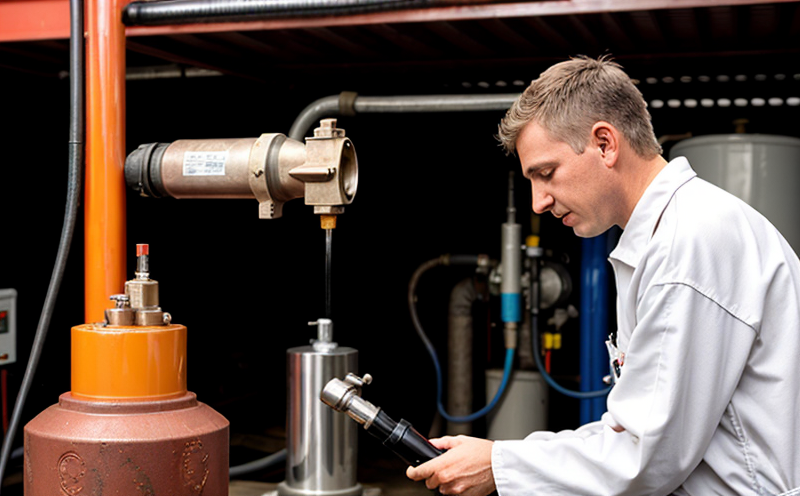ASTM D2700 Knock Rating (Octane Number) Testing
The ASTM D2700 method is a critical tool in ensuring fuel quality for the aerospace and aviation industry. This test measures the knock resistance of gasoline, which directly impacts engine performance and reliability. The octane number obtained from this test is crucial as it helps in selecting the appropriate fuel type to avoid detonation during combustion.
The test involves the use of a standard engine that operates under controlled conditions to simulate the conditions encountered by aircraft engines. The engine's cylinder pressure is monitored, and the sample is subjected to increasing compression ratios until knocking occurs. The compression ratio at which knocking starts is then used to determine the octane number according to internationally accepted standards (ISO 8152).
The process begins with careful preparation of the fuel samples. These samples are typically taken from various sources or batches and must be representative of the entire batch being tested. The specimens should meet all purity requirements as specified by ASTM D2700 to ensure accurate results.
Once prepared, the samples undergo rigorous testing using a standardized engine. This engine is equipped with precise sensors that monitor pressure, temperature, and other parameters relevant to combustion events. The data collected during these tests provide insights into how different fuel compositions behave under various conditions.
The results of ASTM D2700 knock rating (octane number) testing are used by manufacturers to develop fuels tailored specifically for their engines' needs. By understanding the exact octane requirements, they can optimize engine performance while minimizing issues like knocking or pre-ignition. This not only enhances fuel efficiency but also extends engine life and reduces maintenance costs.
For quality managers and compliance officers within this sector, ensuring consistent fuel quality is paramount. ASTM D2700 knock rating testing provides a reliable way to monitor these standards across different production batches and suppliers. It allows for proactive adjustments to formulations before they reach the market, thereby maintaining high levels of safety and reliability.
In addition to its role in engine design and manufacturing, ASTM D2700 knock rating tests also play an important part in aviation fuel certification processes. Airlines and aircraft manufacturers rely on these results to ensure compliance with international regulations regarding fuel quality. Properly conducted testing ensures that all fuels meet the stringent requirements set forth by organizations like ICAO (International Civil Aviation Organization).
The precision and reliability of ASTM D2700 knock rating tests make them indispensable for R&D engineers working in this field. They can use these results to explore new fuel blends or additives that could improve performance further without compromising safety.
For procurement teams dealing with multiple suppliers, ASTM D2700 provides a clear benchmark against which to compare different offerings. This helps them make informed decisions about which suppliers provide the most consistent and highest quality fuels suitable for their specific applications.
Applied Standards
The ASTM D2700 knock rating test follows strict guidelines outlined in the ASTM International standard document. This includes detailed instructions on sample preparation, engine setup, operating procedures, and data analysis techniques. Compliance with these standards ensures that tests conducted by different laboratories yield consistent results.
International equivalents include ISO 8152 which provides additional context around octane rating determination methods. Both standards emphasize the importance of accurate measurement practices to maintain industry-wide consistency in fuel quality assessment.
The use of these internationally recognized standards also facilitates smoother international trade and collaboration between various stakeholders involved in aviation fuel supply chains worldwide.
Industry Applications
In the aerospace and aviation sector, ASTM D2700 knock rating testing has numerous applications. It is primarily used by aircraft engine manufacturers to ensure that their products operate optimally on specific fuel types.
Airlines and air cargo companies rely heavily on this test during routine inspections of fuel tanks and lines to verify compliance with safety regulations. Regular testing helps identify potential problems early, preventing costly downtime or accidents.
For aircraft maintenance facilities, ASTM D2700 serves as a key component in their routine checks ensuring that all fuels used meet required specifications before being loaded into aircraft. This prevents incidents such as engine failure due to improper fuel use.
R&D departments within aerospace companies utilize this test extensively when developing new engine designs or exploring alternative fuel sources. Understanding how various fuel types behave under different conditions allows researchers to innovate more efficient and safer engines.
Competitive Advantage and Market Impact
By leveraging ASTM D2700 knock rating testing, organizations in the aerospace and aviation industry gain several competitive advantages. Firstly, they ensure superior product quality which translates into enhanced customer satisfaction and loyalty.
Secondly, adherence to strict international standards enhances brand reputation, making it easier for companies to enter new markets or expand existing ones. A commitment to high-quality fuels is seen positively by consumers and regulatory bodies alike.
In terms of market impact, compliant organizations benefit from increased demand for their products as they align with global safety norms. Additionally, they can command premium prices for superior fuel offerings, thereby increasing profitability margins.





